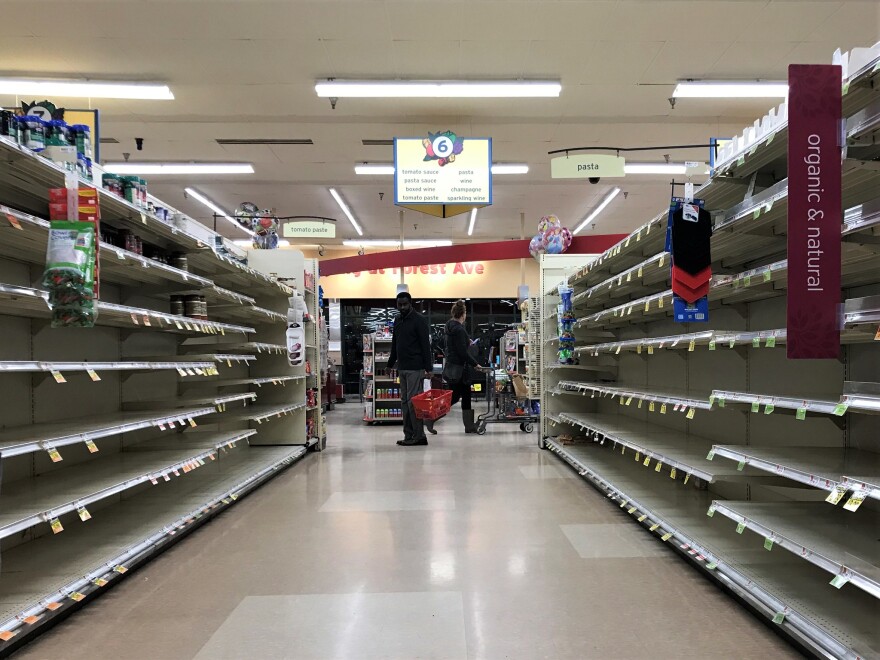Businesses across the state have shut down or moved to largely work-from-home setups, as restrictions are imposed in an effort to limit the spread of COVID-19. But "essential businesses" such as grocery and convenience stores are staying open. And, despite the addition of new policies to protect employees, many are still feeling anxious in the workplace.
Mindy-Bergeron Lawrence remembers walking into her job at a local McDonald's restaurant about two weeks ago, as cases of COVID-19 began trickling into Maine. She was nervous. Though Bergeron-Lawrence used lots of hand sanitizer and sprayed down countertops and other surfaces, she was still in contact with hundreds of people a day. The constant interactions made her worried for her own safety, and the safety of others.
“You're hearing the CDC say, 'Limit your contact with people. Don't gather with groups of people, and so on and so forth.' And yet you're working in an environment where you're not able to do that. You're coming into contact with as many as 80 or so people in a single hour. So that was really stressful.” Bergeron-Lawrence says the stress was exacerbated by McDonald's limited paid sick leave policy at the time. In recent weeks,the company has announced it will provide paid leave at corporate-owned stores, with many other employees covered by the new federal relief bill. But Bergeron-Lawrence says the uncertainty can make the workplace tense — and forces employees like her to balance their finances against their health.
“There's like this palpable anxiety, I think, among us and the customers. It's this weird thing that's hanging there now. You can feel it in the air.”
Bergeron-Lawrence is one of thousands of retail and food service industry employees, often low-wage, who are still on the job across the state, even as many other businesses have closed or allowed employees to work from home. While many businesses have increased hygiene protocol and added barriers, signs and markers, and implemented new leave policies, the anxiety about exposure to the virus has led some employees to decide to stay home.

“I've had three or four people that have gotten done, out of just nerves. And so we've allowed them to go home and spend time with their families. And I think you're going to see more and more of that going forward,”says Shawn Cunningham, the manager of Tobey's Grocery in South China.
Cunningham says that in recent days, several employees have decided to step away because of health concerns for themselves or at-risk family members. At the Rising Tide Co-op in Damariscotta, managers estimate that up to a quarter of employees have decided to stay home and use accrued paid leave. Others have had their hours shifted to reduce contact with customers.
In response to those concerns, many stores have implemented several new kinds of practices intended to protect employees. Many grocery stores, including chains like Hannaford and Shaw's, have added Plexiglass barriers in front of cashiers. Companies have also added markers along the floor promoting social distancing. And others have added "hazard pay" — upping employees' hourly wages during the pandemic.
Kimberly Brackett, the owner of Brackett's Market in Bath, says her store is constantly working with grocers across the state and country to identify new practices to protect workers.

“This is what you should do, this is where you can get this item. This is good practice for you. Try this, this is not working, this is what we're all working on.”
Tuesday's "stay at home" order from Gov. Janet Mills put even further limits on essential businesses, including restricting how many customers can be inside a store, depending on its size.
Jon, who works at a Circle K convenience store, and asked that Maine Public not use his last name, says he appreciates that his own workplace has instituted similar policies, but still feels nervous at times.
“The strange thing is that the barrier causes more anxiety. Only just because it kind of gives you the realization of the situation you're in.”
Other stores are also embracing new delivery and curbside pickup operations, though some smaller grocers say those new services can require technology or increased staffing, making them difficult to implement or expand.
Ryan Doherty, who runs a small convenience store in rural Freeport with his wife, says at least 90 percent of his customers are still choosing to come enter the store instead of using a pickup option. He says while he's thankful to still be operating after so many other stores have closed, the constant news about the virus — plus the numbers of out-of-state cars he saw coming through last weekend — have some of his family members on-edge.
“That's what our fear is, is somebody coming from somewhere that they shouldn't be. They should have stayed in place. But they're not staying in place. They're moving. And they shouldn't be.”
So to deal with that unease, he deep cleans, often five or six times a day.
“I've had to go to wearing gloves all the time , because the bleach was starting to eat the skin right off my hands. But, all in all, I have no complaints. Compared to other people, I have no complaints. I'm still working and still doing well.”
One small positive of the pandemic, say some workers, is a seemingly newfound appreciation for their profession from the public. Mindy Bergeron- Lawrence says she's certainly heard more 'thank you's coming her way from McDonald's customers in recent weeks.
“There has been a lot of, I think — I hope — people realizing that grocery store workers and fast food workers and restaurant workers, and all these people that they kind of have dismissed, are keeping things going right now.”
And Bergeron-Lawrence hopes that attention leads to more respect and increased wages and benefits in the future.
Originally published April 1, 2020 at 6:00 p.m. ET.





